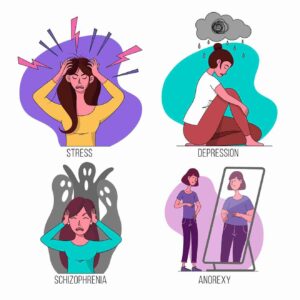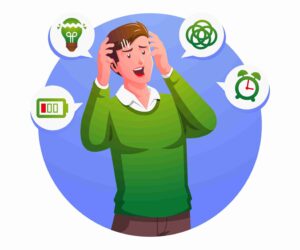Everybody experiences stress at some point in their lives, whether triggered by work, relationships, the pressures of daily life, or personal challenges. If you can’t handle it, it can affect your physical, emotional, and mental well-being. Read more about Symptoms of Stress and Meditation for Stress
What is Stress, and Why Does It Happen?
Your body’s natural reaction to pressure or danger is stress. When you perceive dangers, whether imagined or real, your nervous system releases stress chemicals like cortisol and adrenaline. These hormones prime your body for a “fight or flight” response, a fast reaction.It can become harmful if stress continues for a long time.
The Different Types of Stress:

Let’s discuss different types of stress that affect the human body.
Acute Stress: Short-Term Reactions to Life’s Curveballs
temporary tension brought on by a particular occasion, like making a presentation, sudden loss or natural disasters.
Chronic Stress: The Silent, Long-Term Strain
Ongoing problems like a toxic work environment or financial struggles cause long-term stress.
Episodic Stress: When Stress Becomes a Pattern
Repeated stress episodes due to a fast-paced lifestyle or constant worrying.
The Long-Term Impact of Early Life Stress:
How Stress Affects Your Mind and Body
Childhood stress can significantly impact one’s well-being later in life. Over 18,000 participants in a study show the everyday adverse childhood experiences (ACEs):
- Emotional Neglect: 15% said they were emotionally neglected.
- Domestic Violence: 13% witnessed their mothers being abused.
- Emotional Abuse: 11% of participants reported being emotionally abused during childhood.
- Sexual Abuse: 21% reported being victims of sexual abuse.
- Physical Neglect: 10% faced physical neglect.
- Physical Abuse: 28% experienced physical abuse.
- Substance Abuse in the Family: 27% grew up with a family member who used drugs or alcohol.
- Parental Separation or Divorce: 23% lost a parent due to divorce or separation.
- Mental Illness in the Family: 19% had a family member with mental health issues.
- Substance Abuse in the Family: 27% grew up with a family member who used drugs or alcohol.
- These early life difficulties frequently influence how people handle stress as they get older, highlighting the significance of promoting and managing mental health at a young age.

How Social Media Can Contribute to Stress and Anxiety:
Social media can have both beneficial and detrimental effects on mental health.Although it can facilitate communication, there are several ways in which it could increase stress and anxiety:
Comparing Socially
When people are constantly exposed to well-chosen, romanticized depictions of other people’s lives, it might cause comparison anxiety, feelings of inferiority, or FOMO. This can lead to stress and low self-esteem.
Impractical Expectations
People may feel pressured to live up to exaggerated expectations to maintain a flawless online persona or acquire likes and followers, which can lead to stress.
Decreased In-Person Contacts
Overuse of social media can decrease face-to-face social connections, resulting in feelings of isolation and loneliness that can exacerbate anxiety.
Interrupting Sleep
Social media use, particularly late at night, can interfere with sleep cycles, which can hurt mental health and raise stress levels.
Symptoms of Stress:
People react differently to stress. To correctly manage stress, it’s critical to identify these symptoms.
Let’s discuss the Symptoms.
Symptoms of Emotion
- Feeling stressed or overburdened
- Anger or irritability Sadness or depression
- Having trouble concentrating or deciding
- Absence of drive
Physical Symptoms
- Migraines or headaches
- Fatigue and a lack of energy
- Tension or soreness in the muscles
- Issues with the stomach (indigestion, nausea)
- Having trouble falling asleep
Behavioural Symptoms
- Avoiding social interactions
- Delaying or avoidance of tasks
- Variations in hunger (eating more or less)
- Avoiding social interactions
- A rise in drug, alcohol, or cigarette usage
- Nervous behaviours such as nail biting
Stress Management Techniques
“Beyond Meditation: 9 Effective Ways to Relieve Stress Naturally”
Stress management means identifying stressors and using strategies to handle them. You can work out, relax, and efficiently manage your time. According to “The National Institute of Mental Health”, There are many ways that can help you to reduce depression, anxiety and stress.
Let’s Discuss some of these ways.
Effective Physical Activities:

Regular exercise can help lower stress levels and elevate mood when you’re feeling anxious. Exercise also eases physical tension and enhances the quality of sleep, two things that are frequently impacted by stress. According to a “6-Week Study” involving “185 college students,” engaging in aerobic exercise twice a week considerably decreased both felt stress from uncertainty and overall stress. Additionally, the exercise habit significantly decreased self-reported depression.
Minimize Screen Timing :
Excessive screen time increases stress, impacts mental health, and disrupts sleep. Limiting device use can effectively improve well-being and reduce stress.It may affect sleep negatively, which leads to increased stress levels.
Journaling Can Help Relieve Stress and Boost Self-Reflection:
Expressing ideas and feelings in a journal is an easy method to reduce stress. It helps clear your mind, identify stress triggers, and encourage self-reflection, promoting emotional balance and clarity.
Spend Your Time With Nature and Exploring: (Me Time )
According to a “Review of 14 Studies,” spending just 10 minutes in nature can enhance mental health, lower stress, and increase happiness, particularly for college-aged people.Spending time in green spaces like parks or forests and exploring nature’s beauty effectively manages stress.
Seek Support: Spending time with lovely Ones:
Social support from friends and family might help you manage stress. “A 2019 study” found that low support from loved ones is linked to loneliness, depression, and higher stress in young adults. A robust support system is beneficial for mental health. If you lack close connections, join a club or sports team or volunteer to build new relationships.
Usage of Time Management Tools:
Time management tools facilitate efficient work organization and prioritization. Calendars, apps, and planners can be used to keep track of due dates and divide work into manageable chunks. Staying organized reduces stress and boosts focus. These tools improve efficiency and give you better control of your day.
Cuddle: A Human Touch
Human contact can enhance well-being and minimize stress. Positive physical contact, like hugs, may lower cortisol and release oxytocin, promoting relaxation. This can reduce blood pressure and heart rate, common stress symptoms.
Set limits and Practice to say “NO”:
You can’t control all stressors, but you can control some. Taking on too much increases stress and reduces the time for self-care. Saying “no” more often helps protect your mental health, especially when you’re overburdened. Select what you take on and create boundaries to reduce stress. For example, ask people to avoid visiting unexpectedly or cancelling plans when you need space.
The Power of Deep Breathing: An Easy Way to Stress-Reduction:
This is an easy strategy for reducing and controlling anxiety and tension. This is an essential exercise that you may perform in any circumstance. It immediately lowers stress and anxiety by triggering the body’s relaxation response.
Meditation for Stress Relief: Your Go-To Solution:

Unless they are treating an underlying disease, such as depression or anxiety, doctors usually do not recommend medicine for stress. In such cases, they may prescribe antidepressants. However, these medications may only mask stress and can have side effects, “Such as Low Libido”.
Benefits of Meditation: The Science Behind It
Meditation calms the body and mind, which helps people feel less stressed. It lowers blood pressure and heart rate by triggering the relaxation response. Frequent Practice activates parts of the brain related to focus and emotional control. Meditation also reduces cortisol, the stress hormone, and improves overall mental well-being.
Different Types of Meditation for Stress and Anxiety:
There are several types of meditation to manage stress and anxiety. Let’s discuss some of these.
Guided Meditation:
During guided meditation, an instructor guides you through relaxing imagery and relaxation techniques. This can be especially helpful for beginners and those looking for structured guidance.
Loving-Kindness Meditation (Metta)
The main goal of this exercise is to send love and compassion to yourself and other people. It can reduce stress by promoting positive emotions and improving emotional well-being.
Meditation Using Body Scan
By concentrating on each body region, this style promotes awareness of bodily sensations and aids in relaxation. It can relax the mind and ease tension.
Breathing Meditation

Breathing meditation focuses on controlled, deep breathing to calm the nervous system. It reduces stress and anxiety by helping you slow down and focus on your breath.
Mindfulness Meditation
This type focuses on staying present and aware of your thoughts and feelings without judgment. It helps reduce anxiety by encouraging acceptance and awareness of the present moment.
Mindfulness-Based Cognitive Therapy (MBCT)
MBCT blends mindfulness practices with cognitive behavioural therapy. It is often used to treat depression by helping individuals manage thoughts and emotions.
Meditative Movement
Practices like tai chi, qigong, and yoga combine movement with mindfulness. These forms of exercise encourage awareness of body sensations and promote relaxation.
Concentration Meditation
This type focuses the mind on one object, such as your breath or body posture, to improve focus and calmness.
Mantra Meditation
Mantra meditation involves repeating a calming word or phrase silently or aloud.It promotes mental focus and aids in blocking out distractions. In order to attain profound relaxation, practitioners of transcendental meditation (TM) repeat a customized mantra, such as a phrase or sound. Every form of meditation has special advantages for reducing stress and anxiety. You can determine which approach works best for you by trying out various approaches.
Drawbacks of Meditation:

Research shows that meditation offers many health benefits, but not everyone experiences positive effects.
Some Drawbacks are mentioned below.
Not for Everyone
Meditation only works for some; some may not experience its benefits.
Negative Experiences
Approximately 8% of people say that meditation makes them feel more nervous, depressed, stressed.
Possible Triggers
Adverse outcomes can stem from factors like intense Practice, unqualified instructors, or existing mental health challenges.
Feelings of Frustration
Individuals with depression or anxiety may feel frustrated or guilty if they don’t achieve results quickly.
Short-Term Effects
Most negative effects are temporary and similar to those seen in other psychological treatments.
Other Stress Relief Options
Meditation isn’t the only way to reduce stress. Activities like walking, dancing, or running can also provide relief.
Final Thoughts:
Stress is a part of life, but managing it is essential. Meditation can reduce stress, improve focus, and promote calmness. It may only work for some, but trying different types can help. Combine meditation with healthy habits like exercise or nature walks for better balance. Stress management is personal, so find what works best for you.


Hi, this is a comment.
To get started with moderating, editing, and deleting comments, please visit the Comments screen in the dashboard.
Commenter avatars come from Gravatar.